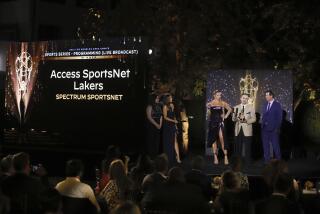FCC should help reach deal to end Dodgers TV standoff, lawmakers say
A group of Southern California lawmakers wants the Federal Communications Commission to broker a deal to end the bitter standoff between Time Warner Cable and other pay-TV providers over distribution of SportsNet LA, the new channel that is home to the Los Angeles Dodgers.
Launched this year, SportsNet LA is not available in the majority of pay-TV homes in the Los Angeles market. Time Warner Cable secured rights to distribute the Dodgers-owned channel in a 25-year deal worth $8.35 billion, according to a valuation by the Dodgers and Major League Baseball.
Time Warner Cable has been unable to land carriage agreements with other distributors serving the market including DirecTV, Cox Communications, Charter Communications and Verizon FiOS. Only Time Warner Cable subscribers have access to the channel which means about 70% of the market has been unable to see Dodger games on TV except for the handful that have been nationally televised on Fox and ESPN.
At issue is the price Time Warner Cable is seeking to carry the channel. According to people familiar with the talks, Time Warner Cable wants more than $4 a month per subscriber in the first year with the price rising steadily through the life of the deal. Distributors including DirecTV have said they want flexibility to offer the channel only to subscribers who want it and not all subscribers.
Now seven members of Congress led by Rep. Tony Cárdenas are calling on the FCC to mediate an agreement between Time Warner Cable and distributors.
“Consumers deserve the opportunity to watch their program of choice,” Cárdenas wrote to FCC Chairman Tom Wheeler. “The ongoing stalemate between Time Warner Cable and other pay-TV providers has reached a point where mediation by the FCC is necessary.”
Co-signing the letter with Cárdenas were Democratic House members Lucille Roybal-Allard, Judy Chu, Alan Lowenthal, Linda Sanchez, Janice Hahn and Julia Brownley.
In the letter, Cárdenas wrote that there are “concerns that the current dispute may set a precedent for vertically integrated companies to hold the consumer hostage to assert unfair market dominance.” The FCC, the letter said, “must ensure that we have a competitive market and no one company has an unfair advantage at the expense of consumers.”
In an interview, Cárdenas said the lawmakers are asking the FCC to get involved in because this dispute is “tremendous.” He said he has heard from constituents who “can’t watch their favorite team and they’re bummed.”
Traditionally, the FCC has been reluctant to get involved in disputes between programmers and distributors, preferring to let the companies resolve their decisions in private. An FCC spokesman did not respond to a request for comment.
The FCC is in the process of reviewing Comcast’s proposed purchase of Time Warner Cable for more than $40 billion. One of the concerns raised by the merger is that it will give Comcast more leverage in selling content it owns to rival distributors.
“There is a lot more control by fewer companies,” Cárdenas said of the consolidation going on in the media industry.
L.A.-area politicians have mostly steered clear of the Dodgers TV fiasco. In April, Los Angeles Mayor Eric Garcetti called on all the parties involved to try to get a deal but also acknowledged that there wasn’t much his office could do to a force an agreement. The City Council has held no hearings on the issue.
Last week, California Atty. Gen. Kamala Harris spoke out about the standoff on Twitter. On Wednesday evening she tweeted, “first pitch is in 4 mins. Too bad only 30% of LA baseball fans will be able to watch ... can’t y’all work this out? Sure hope so.” The state will also review the Comcast-Time Warner deal.
A Time Warner Cable spokesperson said, “we are open to any activity that will move toward a deal so that fans can once again enjoy their Dodgers.”
Follow Joe Flint on Twitter @JBFlint.
More to Read
From the Oscars to the Emmys.
Get the Envelope newsletter for exclusive awards season coverage, behind-the-scenes stories from the Envelope podcast and columnist Glenn Whipp’s must-read analysis.
You may occasionally receive promotional content from the Los Angeles Times.








